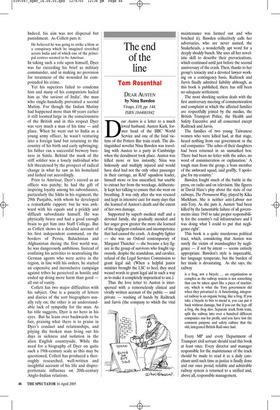The end of the line
Tom Rosenthal
DEAR AUSTEN by Nina Bawden Virago, £10, pp. 144, ISBN 1844081842 Dear Austen is a letter to a much loved husband, Austen Kark, former head of the BBC World Service and one of the fatal victims of the Potters Bar train crash. The distinguished novelist Nina Bawden was travelling with Austen to a party in Cambridge when the derailment took place. Austen was killed more or less instantly; Nina was hideously and multiply injured and would have died had not the only other passenger in their carriage, an RAF squadron leader, himself more or less unscathed, but unable to extract her from the wreckage, deliberately kept her talking to ensure that she went on breathing. It was only after she was rescued and kept in intensive care for many days that she learned of Austen’s death and the extent of her own damage.
Supported by superb medical staff and a devoted family, she gradually mended and her anger grew greater the more she learned of the negligent confusion and incompetence that had caused the crash. A doughty fighter — she was an Oxford contemporary of Margaret Thatcher — she became a key figure in the group of survivors who fought vigorously, despite the scandalous, and cavalier, refusal of the Legal Services Commission to grant legal aid. (When a helpful junior minister brought the LSC to heel, they used weasel words to grant legal aid in such a way as to make it completely impractical to use.) Thus the love letter to Austen is interspersed with a remorselessly clinical and vividly written account of the public — and private — washing of hands by Railtrack and Jarvis (the company to which the vital maintenance was farmed out and who botched it). Bawden collectively calls her adversaries, who are never named, the Snakeheads, a wonderfully apt word for a deeply shoddy bunch. She uses all her novelistic skill to describe their prevarications, which continued until just before the second anniversary of the crash. Then, thanks to her group’s tenacity and a devoted lawyer working on a contingency basis, Railtrack and Jarvis finally admitted liability although, as this book is published, there has still been no adequate settlement.
The most shocking section deals with the first anniversary meeting of commemoration and complaint at which the affected families are respectfully joined by the medics, the British Transport Police, the Health and Safety Executive and all concerned except Railtrack and Jarvis.
The families of two young Taiwanese women who were killed had, at that stage, heard nothing from our government or the rail companies: ‘The ashes of their daughters had been returned in an unmarked box. There had been no letter with the ashes, no word of commiseration or explanation.’ A tough man from the group, a born member of the awkward squad, said gruffly, ‘I apologise for my country.’ Bawden fought much of the battle in the press, on radio and on television. She figures in David Hare’s play about the state of our railways, The Permanent Way, played by Kika Markham. She is neither anti-Labour nor anti-Tory. As she puts it, Austen ‘had been killed by the lamentable failure of all governments since 1945 to take proper responsibility for the country’s rail infrastructure and I was doing what I could to put that negligence right’.
This book is a quite murderous political tract, which, considering that Austen was surely the victim of manslaughter by negligence — if not by intent — seems entirely appropriate. Bawden’s style is impeccable, her language temperate, but the burden of her tirade is devastating. As she says, the railway
is a frog, not a bicycle ... an organisation as complex as the railway system is not something that can be taken apart like a piece of machinery, which is what the Tory government did when they privatised it. A functioning, integrated railway is an organic being, like a frog. If you take a bicycle to bits to mend it, you can put it back without damage, but if you cut the legs off a frog, the frog dies. Separate track from train, split the railway into over a hundred different companies run for profit, and you have lost the common purpose and safety culture that the old, integrated British Rail once had.
Every MP and every Department of Transport civil servant should read this book at least once. Every director and manager responsible for the maintenance of the track should be made to read it as a daily catechism until such time as justice is finally done and our once proud, reliable and admirable railway system is returned to a unified and, above all, responsible management.
























































 Previous page
Previous page